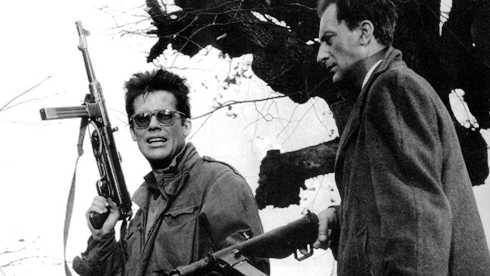 Polish director Andrzej Wajda examines the dashed hopes of postwar Poland in this story of a partisan fighter (Zbigniew Cybulski) caught between the ideals of the Communist movement and its sordid realities.
Polish director Andrzej Wajda examines the dashed hopes of postwar Poland in this story of a partisan fighter (Zbigniew Cybulski) caught between the ideals of the Communist movement and its sordid realities.
Sometimes when I revisit a good film, I start to notice a few flaws which lower my regard for the movie a little bit. But that didn’t happen on a recent re-viewing of Ashes and Diamonds, the 1958 film by Polish director Andrzej Wajda. Instead it reaffirmed my opinion that this is one of the finest works of cinematic art I’ve ever seen.
Ashes and Diamonds takes place during the turmoil of post-World War II Poland, with the Communists taking power but still facing resistance from the non-Communist wing of the resistance movement. The main character is a partisan of that group named Maciek, played by the wildly popular young actor Zbigniew Cybulski. As the film opens, he and his superior stage a hit on a car that they think contains a Communist district leader named Szczuka. They then hide out at a provincial hotel, where it so happens that a group of Communist officials are gathering for a celebratory dinner. To their dismay, they discover that they killed the wrong man: Szczuka is one of the guests at the hotel. Maciek is ordered to assassinate Szczuka before the night is over. In the meantime he flirts with a pretty barmaid, played by Ewa Krzyzewska, and as he gets to know her better, starts to have some misgiving about his mission.
Cybulski was known as the Polish James Dean, and with his sunglasses and longish hair he seems completely different than any other character in the film, perhaps more like someone from the 50s rather than the 40s. But this ends up working to the movie’s advantage—Maciek is a fascinating combination of cool mysterious loner laughing at fate, and a wounded soul-searcher. Cybulski lends the role a kind of dark, offbeat poetry.
The goings-on in the hotel represent a microcosm of a war-weary society in which everything has been turned upside down and nothing is what it seems. Wajda uses extensive tracking shots to glide through the multi-character action, and the crisp black-and-white cinematography is nothing less than superb. One beautiful touch is the character of Drewnowski, an official in the mayor’s office played by Bogumil Kobiela, who plans to get ahead in the new government but gets hilariously drunk during the dinner and ends up sabotaging his career. This is kind of a clue to the movie’s method, in which the official version of things fails to conceal underlying corruption and social tensions. The film’s greatest sequence, towards the end, contrasts Maciek’s desperation with a rueful Polonaise, a surreal dance by the hotel guests expressing the sadness of a place and time without reason. Wajda’s baroque visual flair expresses a deeply ironic humanism, in a film that touches a wealth of insights and feelings experienced when we are poised on the edge of the unknown.
The melancholy masterpiece Ashes and Diamonds is available on DVD.

Kurosawa’s 1954 epic adventure is a profound cinematic experience. There’s a sports metaphor I’ve heard used, in basketball mostly, when they say that a...

An actress studies a woman who was the subject of a scandal involving sex with an underage person, in order to play her in...

At the beginning of Close Your Eyes, the recent film by Spanish director Victor Erice, is a beautifully composed and acted opening scene, set...